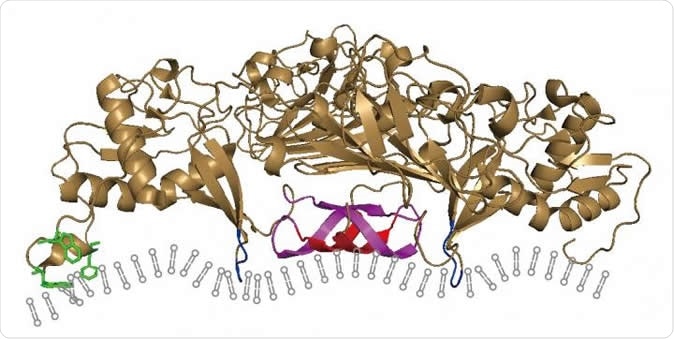The World Health Organization (WHO) declared the Zika virus infection a global threat during the peak of its outbreak in 2016. Since then, scientists and health experts raced to understand the virus better to develop novel and effective vaccines and treatments for the disease. Now, a team of researchers in China revealed how a protein in the virus reshapes its host to boost viral replication.

A model of how the Zika virus NS1 protein inserts itself into the ER membranes of its host cell, reshaping them to form a protected viral replication compartment. Image Credit: Ci et al., 2019
How Zika replicates
When a person contracts the Zika virus, the body’s antibodies try to combat off the infection by attacking the virus’ envelope, which protects it from the immune response. The scientists at Peking Union Medical College have found that NS1, a viral protein, converts an interior cellular compartment in the virus, dubbed as the endoplasmic reticulum (ER), into a protective area where the virus can survive and replicate.
Once the virus enters the host’s body, it goes into the cell and the NS1 inserts itself into and reshapes the endoplasmic reticulum, causing folding of the membrane-bound compartment inwards. From there, it forms small pockets that house and protects the virus while it replicates the genetic material. It protects itself from the body’s immune defense.
“The architecture of this viral replication compartment is well known, but how the Zika virus remodels the ER is obscure," Lei Shi, a researcher at the Institute of Basic Medical Sciences, Chinese Academy of Medical Sciences and School of Basic Medicine, said.
In the study, when the team mutated NS1 to block the process of inserting itself into the ER, the protein was unable to reshape and remodel the ER and it blocked viral proliferation and replication.
“Data from the model membrane system indicated that the membrane-binding and membrane-remodeling properties of NS1 depend on its hydrophobic insertion into the membrane. These findings demonstrate that NS1 plays a crucial role in flavivirus replication compartment formation by remodeling the ER structure,” the researchers wrote on the paper.
The researchers believe that blocking the process can help develop new strategies to combat the infection and its complications. The Zika virus is similar to many other mosquito-borne diseases that involve reshaping the ER to form protective capsules for the viruses. The team believes that understanding how the Zika virus replicates and potentially battling it can also help fight other similar viral pathogens, such as the dengue virus, chikungunya, and yellow fever.
What is the Zika virus?
The Zika virus causes microcephaly in newborns if the mother has been infected, and a form of paralysis, Guillain-Barre syndrome, in adults.
Zika virus is spread mostly by the bite of an infected mosquito, which bites during the day and night. Aside from mosquito bites, the Zika virus can also be transmitted through sexual intercourse.
The virus can be passed from a pregnant mother to her fetus and it increases the risk of developing birth defects. Currently, there is no vaccine or cure for the Zika virus. Many scientists race to develop a vaccine to protect against the illness.
In most cases, patients with Zika virus infection recover on their own. Many people also have no signs and symptoms. Some people experience a headache, fever, rash, joint pain, muscle pain, and red eyes. The symptoms can last for many days to a week, but cases are just mild and don’t require hospitalization.
Scientists discovered the Zika virus in 1947, and it was named after the Zika Forest in Uganda. Outbreaks of Zika have been reported in Southeast Asia, Africa, and the Pacific Islands since 1952, when the first human cases of the infected were detected.
Journal reference:
Ci, Y., Liu, Z., Zhang, N., Niu, Y., Yang, Y., Xu, C., Yang, W., Qin, C.F., Shi, L. (2019). Zika NS1–induced ER remodeling is essential for viral replication. Journal of Cell Biology, https://rupress.org/jcb/article/doi/10.1083/jcb.201903062/133534/Zika-NS1induced-ER-remodeling-is-essential-for